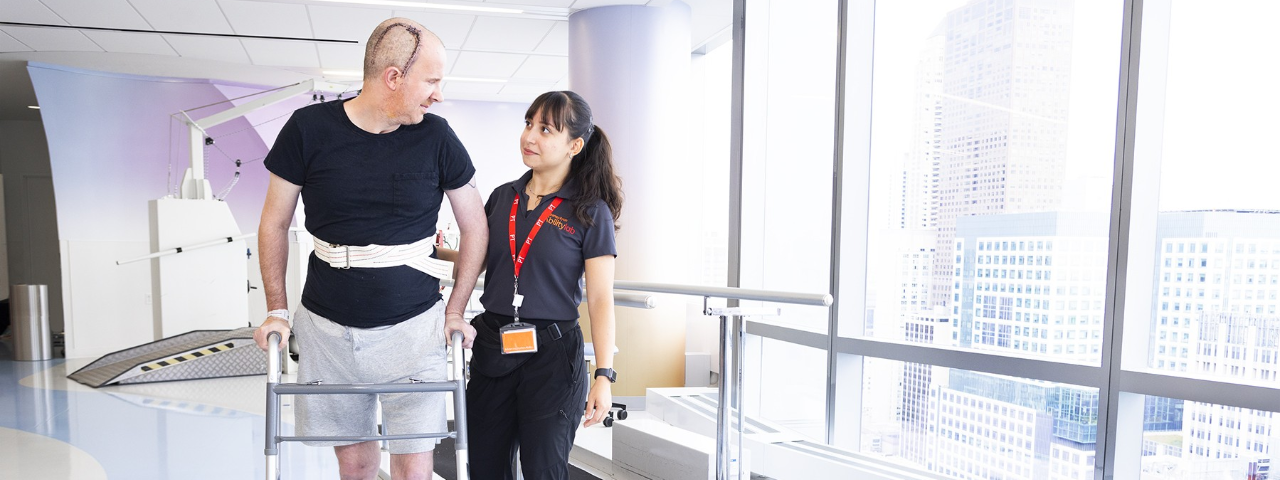Body
Shirley Ryan AbilityLab is a global resource. Clinical trials and research studies are where we bring our integrated care to life. We’re committed to Advancing Ability and sharing what we’re doing and what we learn — with all who seek greater ability and practitioners the world over.
Our five Ability Labs are the first translational research environments in which clinicians, scientists, innovators, technologists and patients work together in the same space, 24/7, discovering new approaches and applying (or “translating”) research real time.
A selection of research publication highlights include:
Person-, Job-, and Environment-Related Factors Associated with Long-Term Job Retention of People with Physical Disabilities
Angelika Kudla, Emily J Dinelli, Pamela Capraro, Deborah S Crown, Manasi Sheth, Robert Trierweiler, Elizabeth Munsell, Jasin Wong, Allen W Heinemann
Facilitators and barriers to employment for people with adult-onset physical disabilities: results from a U.S.A. survey
Emily J Dinelli, Deborah Crown, Angelika Kudla, Pamela Capraro, Manasi Sheth, Robert Trierweiler, Elizabeth Munsell, Allen W Heinemann
Methods for Estimating Costs for Stays at Inpatient Rehabilitation Facilities and Long-Term Care Hospitals
Nicole M Coomer, Jill Akiyama, Melissa Morley, Melvin J Ingber, Benjamin Silver, Anne Deutsch
Automate, Illuminate, Predict: A Universal Framework for Integrating Wearable Sensors in Healthcare
Megan K O'Brien, Kristen Hohl, Richard L Lieber, Arun Jayaraman
Comparative Study of the Pain, Function, and Biomarkers of Joint Disease in the Transition to Adulthood in Individuals With and Without Cerebral Palsy
Chad Hanaoka, Deborah Gaebler-Spira, Rajeswari Pichika, Prakash Jayabalan
Measuring Real-World Talk Time and Locations of People With Aphasia Using Wearable Technology
Laura E Kinsey, Leora R Cherney
Multisite Hebbian Plasticity Restores Function in Humans with Spinal Cord Injury
Hang Hin Jo, PhD, Ethan Kizziar, BS, Sina Sangari, PhD, David Chen, MD, Allison Kessler, MD, Ki Kim, MD, Alan Anschel, MD, Allen W. Heinemann, PhD, Brett D. Mensh, PhD, Saria Awadalla, PhD, Richard L. Lieber, PhD, Martin Oudega, PhD, and Monica A. Perez, PhD
Brain Network Topology Influences Response to Intensive Comprehensive Aphasia Treatment
Marwan N. Maliki, Edna M. Babbitt, and Leora R. Cherney, PhD
Development of a Multidimensional, Multigroup Measure of Self-care for Inpatient Rehabilitation
Andrew J. Bodine, PhD, Allen W. Heinemann, PhD, Julia Carpenter, MA, CCC-SLP, Sally M. Taylro, PT, DPT, Piper Hanson, OTD, OTR/L, BCPR, Richard L. Lieber, PhD, James Sliwa, DO
Implementation Cost Analysis of an Intensive Comprehensive Aphasia Program
Nicole Boyer, PhD, Neil Jordan, PhD, Leora R. Cherney, PhD
Rehabilitation Length of Stay and Functional Improvement Among Patients with Traumatic Spinal Cord Injury
Yu-Hsiang Kao, PhD, Yuying Chen, MD, PhD, Enne Deutsch, RN, PhD, CRRN, Huacong Wen, PhD, and Tung-Sung Tseng, DrPH
Wearable Sensors Improve Prediction of Post-stroke Walking Function Following Inpatient Rehabilitation
Megan K. O’Brien, PhD, Sung Y. Shin, PhD, Rushmin Khazanchi, Michael Fanton, PhD, Richard L. Lieber, PhD, Roozbeh Ghaffari, PhD, John A. Rogers, PhD, and Arun Jayaraman, PT, PhD
Stride Management Assist Exoskeleton vs Functional Gait Training in Stroke
Arun Jayaraman, PT, PhD, Megan K. O’Brien, PhD, Sangeetha Madhavan, PT, PhD, Chaithanya K. Mummidisetty, MS, Heidi R. Roth, PT, DHS, Kristen Hohl, DPT, Annie Tapp, DPT, Kimberly Brennan, PT, Masha Kocherginsky, PhD, Kenton J. Williams, MS, Hideaki Takahashi, MS and William Z. Rymer, MD, PhD

